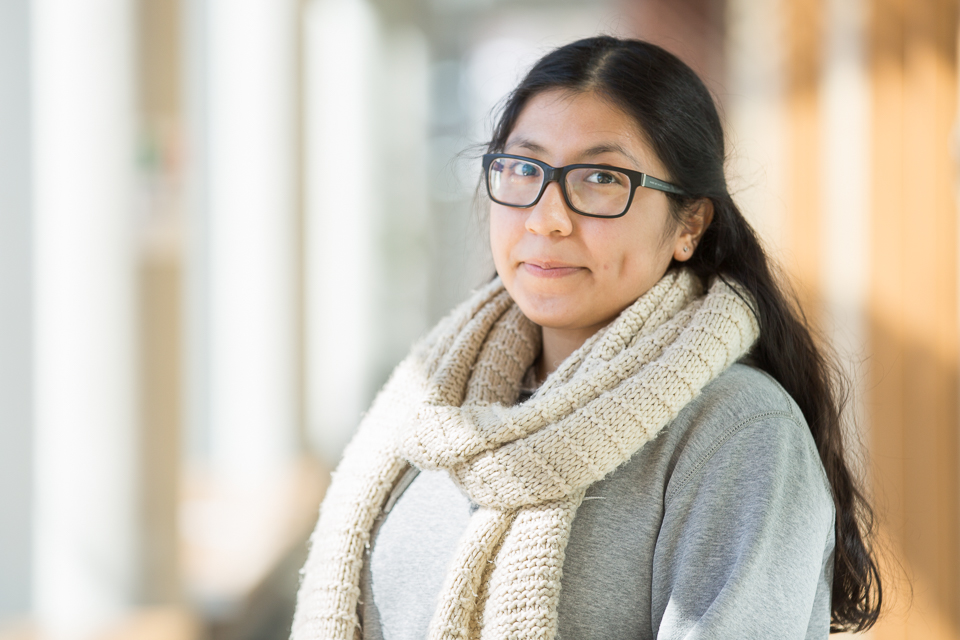The Women's, Gender and Sexuality Studies Program Offers Interdisciplinary Flexibility for Master's Candidate

Photo Credit: Simon Goodacre
March 7, 2019
Abeer Pamuk | Graduate School of Arts and Sciences
Michelle Guaman, a master’s student at the Women’s, Gender and Sexuality Studies (WGSS) program, was drawn to the discipline because of her passion for women's reproductive health, education, and justice. She became interested in these topics shortly after reading Jeanne Flavin’s Our bodies, Our Crimes: The Policing of Women’s Reproduction in America as an undergraduate. “Flavin’s work made me realize that women’s reproductive rights not only entail abortion but encompasses other social issues such as domestic violence, women’s health (e.g. endometriosis and menstruation), and gender equality policies,” says Guaman. She decided that the WGSS program at Brandeis was the ideal place to pursue these interests.
Guaman was attracted to WGSS at Brandeis because of the interdisciplinary nature of the program, which enables her to take classes in other departments, such as Anthropology, English, and Sociology. “Given the diverse areas of study made available within the WGS program I knew I would be able to obtain both a comprehensive and challenging education filled with cross-disciplinary theories,” she says.
Since starting the program in August, Guaman has been diving into the field of sexuality studies, taking courses that explore the cultural and theoretical aspects of sex and sexuality within a global context. For her thesis topic, Guaman hopes to engage in a cross-cultural examination of how culturally enforced messages of menstruation are embedded within advertisements and what their effects are, if any, on young girls and their body image. She has been able to create cross-disciplinary dialogue when writing her academic papers for her classes. “For example, when I engage in menstrual research, I not only examine menstrual discourses within a WGSS theoretical framework but also explore how the social and cultural interpretations of menstruation are discussed with the field of Sociology and English,” she says.
Guaman’s favorite aspect of the program has been her peers in the program. Starting with orientation, WGSS has brought together a cohort with diverse backgrounds who are drawn together by their love of the field. “This connection has been further solidified by the endless hours we can spend talking about cookies, class, theorists, and coffee, while sitting in the big comfy blue coach in the WGS lounge,” says Guaman. “I am so thankful to have such an incredible cohort.”
In addition to learning from her peers, Guaman is surrounded by faculty members who have “been incredibly warm and welcoming from the start.” Professor Sara Shostak, who teaches “Sociology of Body and Health,” has emerged as one of Guaman’s mentors on campus. Ever since she told the professor about her academic interest in the field of menstrual studies, Shostak has provided Guaman with all the support and guidance she needed to continue her research within this field. “You can always rest assured that you’ll have someone to turn to and guide you through your academic journey,” she says.
After Brandeis, Guaman hopes to engage with young girls to promote, expand, and reinforce gender equality policies that focus on women’s reproductive rights. She hopes to help create educative programs that teach girls about menarche while promoting positive sexual and reproductive health education. She encourages people interested in the field of Gender Studies to go for it. “It is an incredibly diverse field of study that will always challenge your beliefs, ideologies, and overall understanding of the world,” she says. “You develop the ability to see the world through a critical intersectional lens that not only allows you to develop a holistic understanding of the world, other cultures and people, but of your own identity. Furthermore, it’s a field that really enables you to become a social justice leader!”






